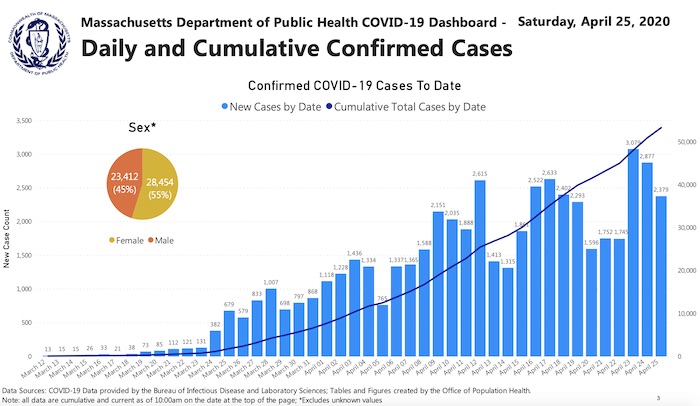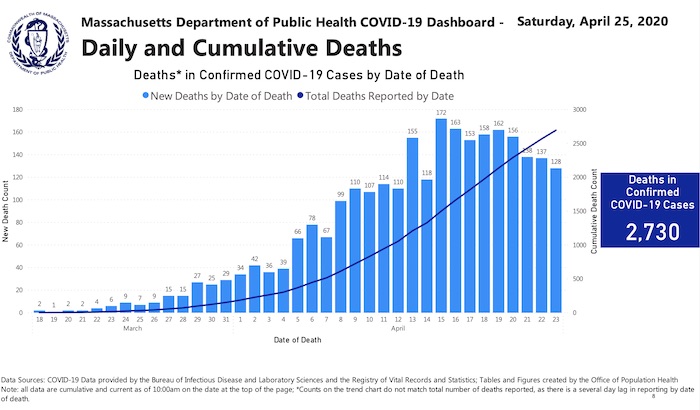Baker: COVID-19 numbers in Massachusetts may be hitting plateau
At the start of an eighth week living under a state of emergency, Gov. Charlie Baker said Monday the data might be starting to show that the coronavirus’s spread has “plateaued” as he committed an additional $130 million to support efforts to fight COVID-19 in nursing homes, where the toll of the pandemic has been particularly harsh.
Baker, however, again said he would have more to say later this week about his thinking on how and when to begin reopening parts of the economy, and Boston Mayor Marty Walsh said in no uncertain terms that May 4 is too early for businesses to invite workers and customers back through their doors.
“I can tell you right now that Boston will not reopen on May 4,” Walsh said.
The press briefings from Baker and Walsh came a week before the governor’s executive order to close all non-essential businesses during the public health emergency is scheduled to expire on May 4.
Baker described Massachusetts as “still in the surge and very much in the fight.” He contrasted the situation in the Northeast with conditions in some other states, particularly across the South, where governors have started to relax stay-at-home advisories.
“The trend data remains reasonably high,” Baker said. “But obviously whatever decision we make needs to come with a little thought and a plan behind it, so we’ll probably put that out later this week.”
Some business groups, including the Mass High Tech Council, have published recommendations for how to reopen that rely on significantly increased testing efforts, which Baker said he supports and is working to implement. Other groups, however, say businesses must be given the chance to show they can protect workers.
“The Federal and State governments have done an admirable job communicating to the public the measures necessary for safe interactions moving forward. Small businesses must be given the opportunity to demonstrate they are willing and capable of re-opening in a responsible and safe manner. That is the only way our state will begin to climb out of the economic disaster it currently finds itself in,” said Massachusetts Fiscal Alliance spokesman Paul Craney.
The governor did say he believed Massachusetts had been successful in “flattening the curve,” and noted that the number of new hospitalizations on Sunday increased by only 32 from the day before.
“It seems to have plateaued, depending upon which part of Massachusetts you’re in, and then the hope and the expectation is it will start to fall, but it will probably fall slowly the same way it ramped up slowly,” Baker said.
Baker said long-term care facilities, including the state’s 386 nursing homes, have “unfortunately evolved into a national hotspot,” with 10,031 confirmed cases of COVID-19 and more than half of the state’s deaths from the disease occurring among residents and staff of the facilities.
The administration said that by the end of the week it would make $130 million in additional funding available for nursing homes to pay for staff, cleaning and personal protective equipment.
“The numbers are tough to comprehend, but they illustrate the lethal grip COVID-19 can have on seniors, and especially those with underlying health conditions, here in the commonwealth and obviously our deepest condolences go out to the families, loved ones and staff who have been impacted by this horrible virus,” Baker said.
The governor also said the state was assembling a team of 120 nurses and certified nursing assistants to deploy in teams of 10 to facilities in emergency situations, and would be auditing long-term care facilities for compliance with a new set of care criteria, including mandatory testing of staff and residents, a 28-point infection control check-list and adherence to protective equipment requirements.
The money – which comes on top of the $130 million made available April 15 — will be sent to facilities that can show they’re living up to those safety standards.
“These funds will be allocated to nursing homes that are meeting a benchmark for certain criteria to ensure these privately operated facilities are working as safely as possible,” Baker said at an afternoon press conference from the State House.
Baker said that fighting the “invisible enemy” can be especially challenging in settings like nursing homes where the coronavirus can spread undetected among residents and staff showing no symptoms.
“That makes controlling the disease much harder, and it also demands a new level of infection control and staffing requirements for our nursing homes so that they can create the safest environment possible,” Baker said. “This, of course, is not easy to do, but it’s expected, required and necessary.”
Health and Human Services Secretary Marylou Sudders said the state would also make $44 million in additional funding available for residential congregate care service providers “to address unplanned, and thus unbudgeted” expenses such as overtime, infection control, cleaning services and personal protective equipment.
The money is in addition to $94 million made available for residential service providers in late March, and Massachusetts hopes to be reimbursed for 75 percent of the staffing costs by the federal government.
Sudders said state agencies work with 238 different residential service providers to help care for 20,500 individuals, including children and those with intellectual and developmental disabilities, and the state plans to increase its monthly reimbursement to those providers in May and June by an additional 15 percent.
Tim Foley, the executive vice president of 1199 SEIU United Healthcare Workers who was personally thanked by Baker for his help during the press conference, said the increases in funding will lead to “enhanced pay” for caregivers and increased oversight to ensure a safe working environment.
“These actions support nursing home workers who are on the frontlines, brushing aside fear every day, in their fight to stop the spread of the virus and provide care for seniors and people with disabilities,” Foley said in a statement.
SEIU Local 509 President Peter MacKinnon said the rate increases for residential service providers indicate recognition that those care providers are underpaid, despite putting themselves in harm’s way.
“Today’s rate increases are an important reminder of the vital services front line workers provide to serve our community members most in need. There is power in a union, and this announcement shows the strength of all workers in raising their voices, making their needs known, and fighting for what’s right,” MacKinnon said.




